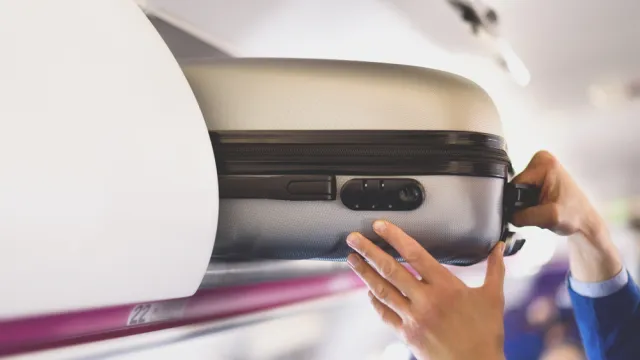Travel Expert Reveals the Sneaky Reason Airlines Make You Check Your Carry-On

Sticking with a carry-on suitcase can save you a lot of stress when traveling. Not only do you get to avoid the extra fees and the time-consuming hassle of waiting at the baggage claim carousel, but you also don’t have to worry about your luggage getting lost. That explains why a 2022 TripIt survey found that 41 percent of travelers are now avoiding checking bags. Sometimes, though, you get all the way to the gate only to be told by the flight crew that you’ll still need to check your carry-on bag. And if you noticed empty overhead bins with plenty of room for your luggage, you may have been left scratching your head.
In an article for the publication View From the Wing, Gary Leff, a travel expert and founder of InsideFlyer, recently revealed some insider intel about why airlines do this. What it ultimately comes down to, Leff says, is saving time—which is very valuable to airlines for several reasons.
RELATED: 7 Surprising Items TSA May Flag You for at Airport Security.
“When overhead bins are full and passengers have brought their carry-on bags onto the plane, [flight attendants] go searching for space and that takes time,” he explains. “When they finally give up and realize they’re going to need to check the bag, they come back to the front of the aircraft and the bag has to be tagged and placed into the hold. This all takes time, and it’s time at the last minute just before departure.”
This frantic last-minute process can risk a flight delay, says Leff. Taking off a few minutes late may not seem like a big deal, but it can cause airline crew to be late to their next flight, and even cause passengers to miss connecting flights if they have short layovers.
In fact, the TripIt survey found that flight delays and changes are the main current concern for travelers, with 70 percent of people saying this is their number one worry next time they take a trip—a 29 percent jump from TripIt’s last survey.
Not only that, but Leff notes that gate agents get rated based on their ability to ensure flights get out on time—not based on customer satisfaction—which gives them further incentive to play it safe and require bags to be checked.
An anonymous Delta Air Lines flight attendant told The Washington Post that gate agents can even be penalized for a late departure. “It’s mark on their record, and if you get however many, you can get fired,” they shared.
“It’s far easier for the gate agent to simply declare overhead bins full, in case they are or in case they’re going to become full,” Leff wrote in his article. “Doing it earlier than later is better for the agent since they bear none of the downside—passengers are already on board and it isn’t their problem—while the risk of having to gate check bags could mean a slight delay to the flight and that means getting yelled at by a manager.”
According to The Washington Post, when they reached out to American Airlines about checking carry-on bags, the airline “said its staff uses its best judgment when determining bags-to-bin space,” acknowledging that sometimes their estimates are off. Delta told the paper “that it switches from voluntary to mandatory bag-checking once the flight attendants have alerted the gate agents to diminishing space.”
Leff says some airlines are upgrading to larger overhead bins as a solution—but not all of them have made this investment yet.
Seeing as a 2022 study found that lost luggage is up 30 percent since 2019, it’s understandable why you might prefer to carry on. Still, there’s clearly no guarantee that the crew will allow you to keep your suitcase on the plane—even if there is room in the overhead bins.
Your best bet? Snagging a seat as close to the front of the plane as possible. Since airlines tend to board these groups first, you have a better chance of finding space for your carry-on bag.
For more travel advice delivered straight to your inbox, sign up for our daily newsletter.